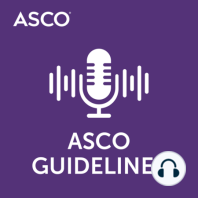27 min listen
Nervous System Toxicities: Management of irAEs Guideline (Part 9)
FromASCO Guidelines
ratings:
Length:
20 minutes
Released:
Nov 10, 2021
Format:
Podcast episode
Description
An interview with Dr. Bianca Santomasso from Memorial Sloan Kettering Cancer Center, author on “Management of Immune-Related Adverse Events in Patients Treated With Immune Checkpoint Inhibitor Therapy: ASCO Guideline Update.” She reviews neurologic toxicities in patients receiving ICPis, such as myasthenia gravis, Guillain-Barre Syndrome, peripheral neuropathy, aseptic meningitis & encephalitis in Part 9 of this 13-part series. For more information visit www.asco.org/supportive-care-guidelines TRANSCRIPT [MUSIC PLAYING] SPEAKER: The purpose of this podcast is to educate and to inform. This is not a substitute for professional medical care and is not intended for use in the diagnosis or treatment of individual conditions. Guests on this podcast express their own opinions, experience, and conclusions. The mention of any product, service, organization, activity, or therapy should not be construed as an ASCO endorsement. BRITTANY HARVEY: Hello and welcome to the ASCO Guidelines Podcast series, brought to you by the ASCO Podcast Network, a collection of nine programs covering a range of educational and scientific content, and offering enriching insight into the world of cancer care. You can find all the shows, including this one, at asco.org/podcasts. My name is Brittany Harvey, and today, we're continuing our series on the management of immune-related adverse events. I am joined by Dr. Bianca Santomasso from Memorial Sloan Kettering Cancer Center in New York, New York, author on Management of Immune-Related Adverse Events in Patients Treated with Immune Checkpoint Inhibitor Therapy: ASCO Guideline Update, and Management of Immune-Related Adverse Events in Patients Treated with Chimeric Antigen Receptor T Cell Therapy: ASCO Guideline. And today, we're focusing on nervous system toxicities in patients treated with immune checkpoint inhibitor therapy. Thank you for being here, Dr. Santomasso. BIANCA SANTOMASSO: Thank you for having me. BRITTANY HARVEY: Then I'd like to note that ASCO takes great care in the development of its guidelines and ensuring that the ASCO conflict of interest policy is followed for each guideline. The full conflict of interest information for this guideline panel is available online with the publication of the guidelines in the Journal of Clinical Oncology. Dr. Santomasso, do you have any relevant disclosures that are directly related to these guidelines? BIANCA SANTOMASSO: Yes, I'd like to disclose that I've served as a paid consultant for Celgene, Janssen Pharmaceutical, and Legend Biotech for advising them on the topics of CAR T cell therapy side effects. BRITTANY HARVEY: Thank you. Then getting into the content of this guideline, what are the immune-related nervous system toxicities addressed in this guideline? And what are the overarching recommendations for evaluation of these neurologic immune-related adverse events? BIANCA SANTOMASSO: So neurologic immune-related adverse events actually encompass a very diverse spectrum of neurologic syndromes that can occur as a complication of treatment with checkpoint inhibitors. So the spectrum that is covered by this guideline includes myasthenia gravis, Guillain-Barre syndrome, polyneuropathy, aseptic meningitis, and encephalitis. And although these are rarer than many of the other immune-related adverse event types affecting other organ systems, they're increasingly being encountered due to more patients being treated with novel combinations of immunotherapies. And they're important to recognize, because along with myocarditis, they have generally more morbidity and even more mortality than irAEs affecting other organ systems. So it's important for clinical care providers to have a high index of suspicion for these events. Studies have suggested that these tend to occur in about 3% to 12% of patients, probably between 1% and 2% of patients developing severe events. So they're rare. But again, the events are probably more commonly seen in patients treated with
Released:
Nov 10, 2021
Format:
Podcast episode
Titles in the series (100)
Practical Assessment and Management of Vulnerabilities in Older Patients Guideline: An interview with Dr. Supriya Mohile from University of Rochester on the guideline published in JCO which provides guidance regarding the practical assessment and management of vulnerabilities in older patients undergoing chemotherapy. To read... by ASCO Guidelines
